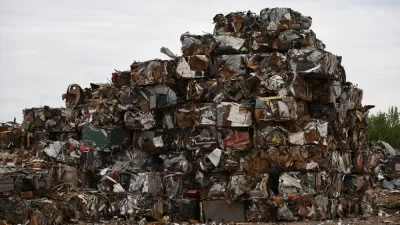With 70 percent of its waste already diverted from landfills, San Francisco continues to push forward with new laws and programs to increase recycling.
"Mayor Gavin Newsom is competitive about many things, garbage included. When the city found out a few weeks ago that it was keeping 70 percent of its disposable waste out of local landfills, he embraced the statistic the way other mayors embrace winning sports teams, improved test scores or declining crime rates.
But the city wants more.
So Mr. Newsom will soon be sending the city's Board of Supervisors a proposal that would make the recycling of cans, bottles, paper, yard waste and food scraps mandatory instead of voluntary, on the pain of having garbage pickups suspended.
"Without that, we don't think we can get to 75 percent," the mayor said of the proposal. His aides said it stood a good chance of passing.
How does he describe his fixation with recycling dominance? "It's purposefulness that could otherwise be construed as ego," Mr. Newsom said. "You want to be the greatest city. You want to be the leading city. You want to be on the cutting edge. I'm very intense about it."
In a more businesslike tone, Jared Blumenfeld, the director of the city's environmental programs, addressed one of the main reasons the city keeps up the pressure to recycle. "The No. 1 export for the West Coast of the United States is scrap paper," Mr. Blumenfeld said, explaining that the paper is sent to China and returns as packaging that holds the sneakers, electronics and toys sold in big-box stores."
FULL STORY: A City Committed to Recycling Is Ready for More

Americans May Be Stuck — But Why?
Americans are moving a lot less than they once did, and that is a problem. While Yoni Applebaum, in his highly-publicized article Stuck, gets the reasons badly wrong, it's still important to ask: why are we moving so much less than before?

Study: Maui’s Plan to Convert Vacation Rentals to Long-Term Housing Could Cause Nearly $1 Billion Economic Loss
The plan would reduce visitor accommodation by 25,% resulting in 1,900 jobs lost.

Placekeeping: Setting a New Precedent for City Planners
How a preservation-based approach to redevelopment and urban design can prevent displacement and honor legacy communities.

San Diego Swaps Parking Lane for Kid-Friendly Mini Park
The block-long greenway will feature interactive play equipment and landscaping.

Tracking the Invisible: Methane Leaks From LA’s Neighborhood Oil Sites
Environmental advocates are using infrared technology to monitor and document methane leaks from neighborhood oil sites, filling regulatory gaps and pushing for stronger protections to safeguard community health and the climate.

Montana Bill Promotes Parking Reform
A bill before the Montana state senate would bar cities from requiring more than one parking spot per new housing unit.
Urban Design for Planners 1: Software Tools
This six-course series explores essential urban design concepts using open source software and equips planners with the tools they need to participate fully in the urban design process.
Planning for Universal Design
Learn the tools for implementing Universal Design in planning regulations.
Caltrans
Heyer Gruel & Associates PA
Institute for Housing and Urban Development Studies (IHS)
City of Grandview
Harvard GSD Executive Education
Salt Lake City
NYU Wagner Graduate School of Public Service
City of Cambridge, Maryland





























